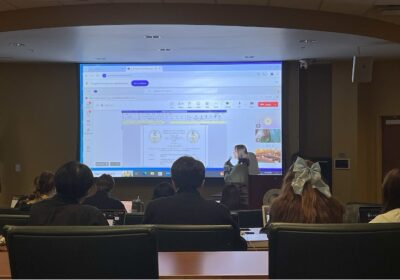Free organic menstrual product dispensers installed on USF Tampa campus

The days of walking into a library bathroom to see a basket of complimentary menstrual products are gone.
These baskets have been replaced by colorful dispensers made by the brand Femly that will still provide free, organic tampons and pads.
These dispensers were installed in seven bathrooms on March 15, according to Lennon Tomaselli, Health and Wellness Manager for Student Government (SG).
Tomaselli said that these bathrooms include:
- First floor of the fine arts building
- Second and third floors of the Interdisciplinary Sciences building
- First and fifth floors of the library
- First floor of Cooper Hall

These are a part of SG’s new period project. This project is a revamp of a previous program in which baskets and dispensers with free menstrual products were available in bathrooms across campus, but were often empty.
The previous period project was introduced in 2020. It relied on baskets and dispensers without locks, leading to the theft of whole baskets in some cases, according to Tomaselli.
The products were being ordered in bulk from Amazon by SG, which grew to be expensive.
Related: Student Government plans free menstrual product access on campus for spring
When Tomaselli took her role in August 2023, she searched for a company that could supply free menstrual products rather than SG having to purchase new products for each restock.
This led Tomaselli to find Femly, a woman-owned menstrual care brand made with eco-friendly paper, according to their website.
The former period project already had an annual budget of $14,360 allocated for it through the activities and services fee in students’ tuition, according to SG Assistant Director Jennifer Bielen.
The new project started with the same budget, but the installation cost was 46% less than the cost of SG providing pads and tampons independently.
The partnership with Femly is expected to save an additional 20% of the budget in the future due to the dispensers being a one-time investment, Tomaselli said.
Each dispenser contains 45 pads and tampons each, with two differently sized options of pads. They are restocked once a week, often by Tomaselli herself, who tries to do so on Mondays.
Some students, like Alexandra Ward, a junior majoring in economics, have not tried the new menstrual products yet.
“I tend to be cautious about organic tampons and pads because they feel like cardboard a lot of the time,” Ward said. “I would definitely take one if I really needed it, but I’m still going to carry my own.”
Others, including sophomore criminology major Ashia Brown, have already been grabbing free products from the dispensers.
“I used one of the tampons for the first time last week and was impressed,” Brown said. “The quality is really good, but there weren’t too many left when I got one.”
Tomaselli hopes the program will continue to expand in future years with future Health and Wellness Managers, as she graduates in May.






